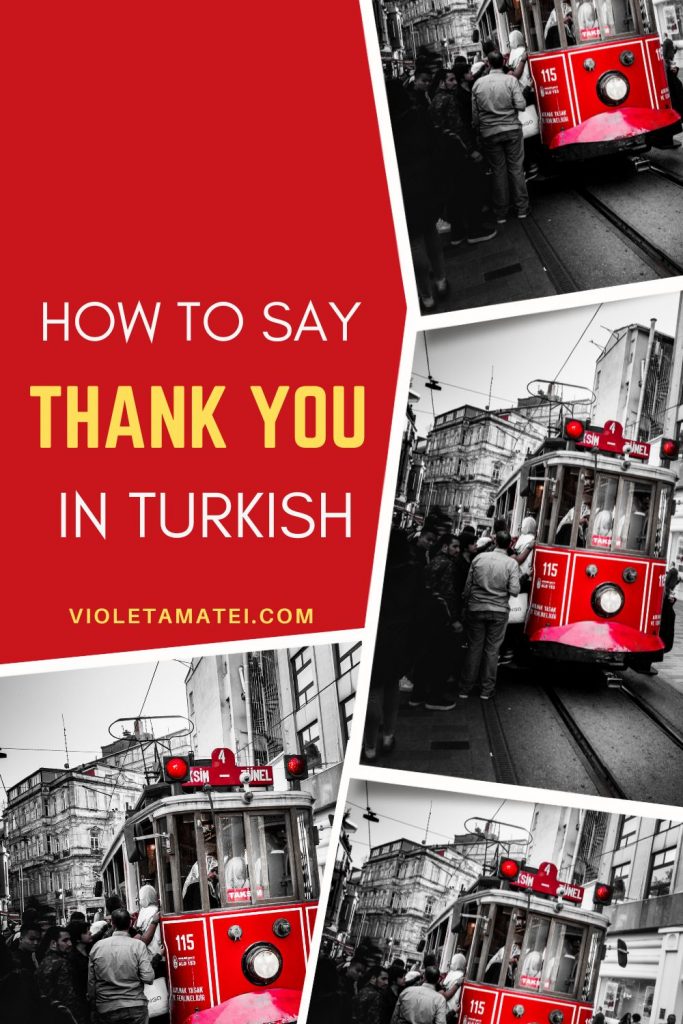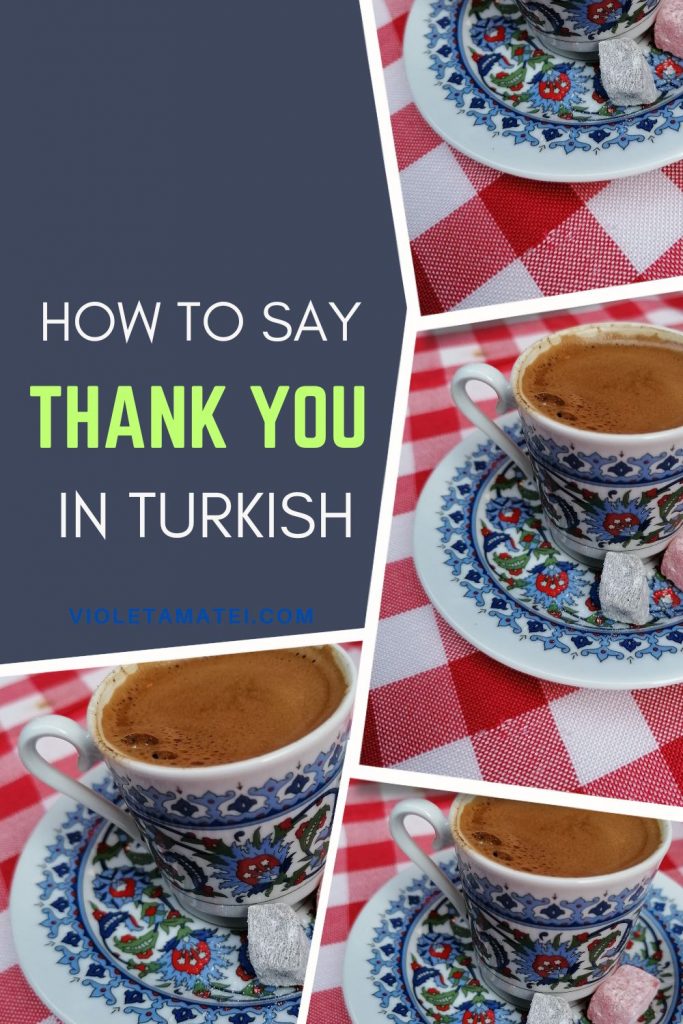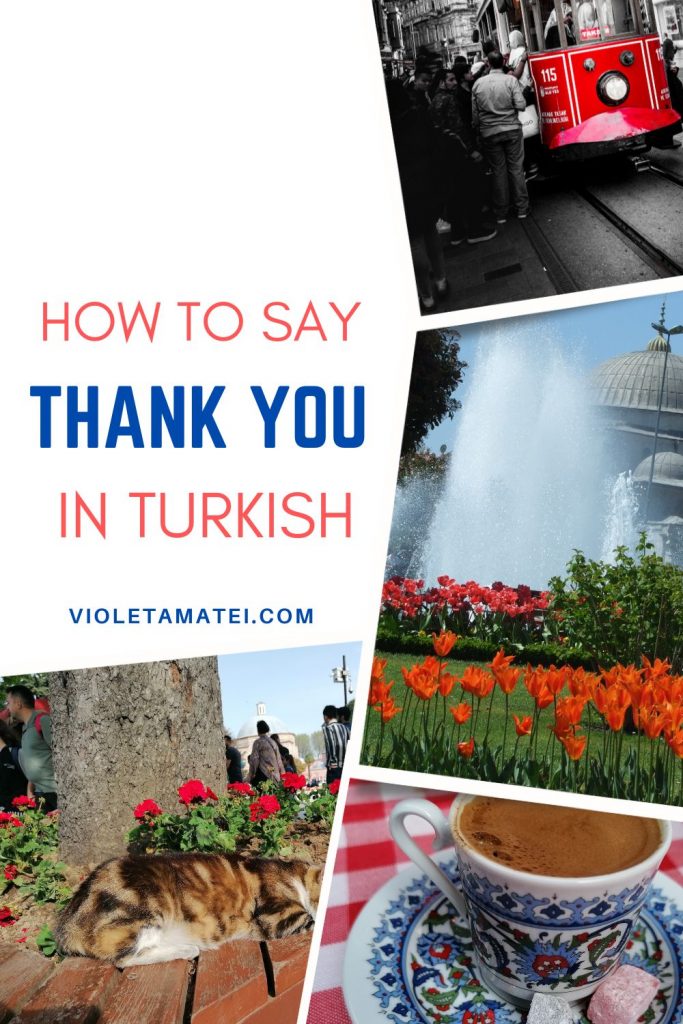Turkey has a rich cultural heritage steeped in traditions of hospitality and etiquette. An important part of interacting with Turkish people is learning how to say “thank you.”
There are several Turkish phrases used to express gratitude, from formal to informal. Even though many Turkish people speak or understand some English, it’s always a nice thing to be able to use a few Turkish words to ask for things or to thank for services.
Here’s a guide to saying thanks in Turkish.

Main Topics of How To Say Thank You in Turkish
Formal Ways to Say Thank You
Here are the formal ways to say Thank you in Turkish. These are the first I’ve learned during my first trip to Turkey, back in 1996 or 1997.
Teşekkür Ederim
The most common formal way to say thank you in Turkish is “TeÅŸekkür ederim.†It translates directly as “I give thanks.â€
Use this phrase when you want to be polite and grateful.
Some examples:
– TeÅŸekkür ederim for your help.
– Thank you for the meal, teÅŸekkür ederim.
– TeÅŸekkür ederim for the thoughtful gift!
You can also use “TeÅŸekkür ederim” as a response when someone thanks you. This phrase is suitable for most situations requiring courtesy and respect.
Teşekkürler
A less formal version is “Teşekkürler.†It conveys “thanks†in a straightforward, but still polite way. This is my favorite Turkish thank you. I use it all the time.
Use Teşekkürler when speaking with colleagues, waiters, retail clerks and acquaintances. For example:
– TeÅŸekkürler for taking the time to explain.
– TeÅŸekkürler, the coffee was delicious.
While friendly, Teşekkürler doesn’t carry the same level of formality as Teşekkür ederim.
Çok Teşekkür Ederim
To emphasize your gratitude, say “Çok teÅŸekkür ederim.†The Çok means “very much,†so this phrase expresses “Thank you very much.â€
Some examples:
– Çok teÅŸekkür ederim for the thoughtful gift!
– Thank you so much for your help, Çok teÅŸekkür ederim.
Use this to convey you are deeply grateful when someone does something especially considerate.
Çok Mersi
“Çok mersi†is a very formal way to say thank you.
Mersi comes from the French “merci†meaning “thank you.†Funny enough, we also have the “mersi” variant in Romanian language, perhaps a remainder of the times of the Ottoman Empire.
Say Çok mersi when you want to be extra polite with elders, authority figures or in very formal situations.
– Çok mersi for inviting me to the prestigious event.
– I appreciate your business, Çok mersi.

Informal Ways to Say Thanks
What if you want to say thank you in Turkish in a less formal manner? Let’s see:
SaÄŸ ol
In casual settings with friends or children, Turks often say “SaÄŸ ol†which means “thank you.â€
Some examples:
– SaÄŸ ol for joining us for dinner.
– SaÄŸ ol for the fun outing today!
Keep in mind SaÄŸ ol is informal. Use it for expressing gratitude in relaxed situations.
SaÄŸ olun
A polite version is “Sağ olun.†Add the -un suffix when speaking to elders, teachers or others deserving of respect.
For example:
– SaÄŸ olun, grandmother for the lovely meal.
– Thank you for the advice SaÄŸ olun.
Çok Sağ ol/Sağ olun
You can emphasize the thank you by saying “Çok saÄŸ ol†or “Çok saÄŸ olun.â€
Çok means “very†in Turkish.
Some examples:
– Çok saÄŸ ol for waiting for me!
– Çok saÄŸ olun for your patience, teacher.
Use Çok sağ ol/olun to intensify a casual thank you when you want to convey sincerity.
Responding To Thanks
When someone thanks you in Turkish, there are several ways to respond politely:
Bir ÅŸey deÄŸil
The most common response is “Bir ÅŸey deÄŸil.†It means “It’s nothing†or “Don’t mention it.â€
– TeÅŸekkür ederim! – Bir ÅŸey deÄŸil. (Thank you! – You’re welcome.)
This shows you are happy to be of help and the thanks is not necessary between friends.
Rica ederim
Alternatively, say “Rica ederim.†This means something like “The pleasure is mine†or “You’re very welcome.â€
Some examples:
– Çok teÅŸekkürler! – Rica ederim. (Thanks a lot! – My pleasure.)
– TeÅŸekkür ederim. – Rica ederim (Thank you. – You’re very welcome.)
Rica ederim is courteous and emphasizes you were glad to help.
Önemli değil
A very informal phrase Turks use is “Önemli deÄŸil.†This means “It’s not important†or “No problem.â€
– SaÄŸ ol! – Önemli deÄŸil. (Thank you! – No problem.)
Önemli değil downplays your effort, for situations between close friends or family.
When To Say Thank You
Here are some common situations when to express gratitude in Turkish:
– When receiving a gift or invitation
– After someone provides help or advice
– When being served at a restaurant
– When someone opens the door for you
– When receiving a compliment
– When concluding a business transaction
– After someone cleans for you
The sincerity conveyed through polite phrases like “Teşekkür ederim†or “Sağ olun†will be appreciated by Turkish speakers.
Though English “thank you†translates directly in Turkish, using native phrases shows respect for Turkish etiquette.
Saying “thank you†is an important way to build relationships and trust in Turkey. Use the right mix of formal and informal phrases to express your gratitude.
Learning this small etiquette gesture can make a big difference in cultural exchange.
With its rich history of hospitality, Turkey offers wonderful opportunities to practice saying thanks. Just check out my article about visiting Ephesus and Troy or the one about unusual things to do in Bodrum to get you started on your Turkey trip planning.

- Dingli Cliffs: How To Visit Malta’s Highest Point - April 24, 2024
- Blue Grotto Malta - April 23, 2024
- Ramla Beach Gozo, Maybe the Best in Malta - April 9, 2024

